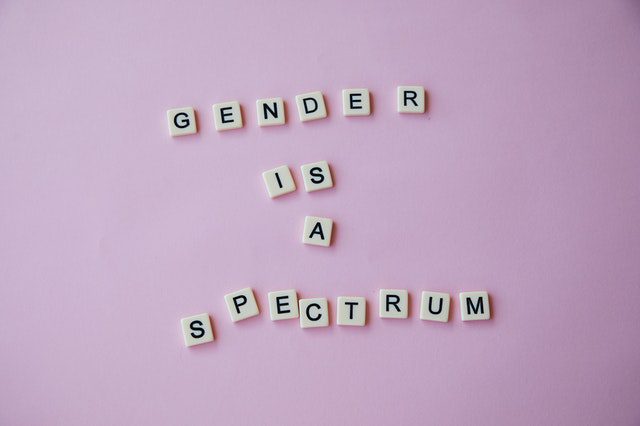
What Does Non-Binary Mean?
Gender and sex are often conflated into the same concept. Distinguishing the critical difference between the two can do a great deal in the way of helping one understand what it means to identify as non-binary.
The following are key concepts to think of when navigating non-binary content, discourse or feelings.
Sex Assigned At Birth:
When a child is born, the doctor in charge will assign sex to the said infant based on their sexual organs. This tends to follow the title ‘male' or ‘female,' but some may be labeled as intersex (depending on chromosomal features, etc.).
Infants that are not born intersex are therefore assigned male at birth (AMAB) or assigned female at birth (AFAB). This puts emphasis on the role that doctors play in the assignment of sex upon birth.
Gender Identity:
A person's gender identity is not the same sex assigned at birth. Gender is far more personal and inward-looking than many may assume, the experience of gender identity is vast and fluid, to many, grappling with this is a life-long journey. Gender identities are not limited to man and woman, contrary to hegemonic ideas -they extend to non-binary, agender, gender-queer and a variety of other gender identities that one may resonate with.
Cisgender (Cis)
This is when a person identifies with the sex assigned to them at birth, i.e. someone assigned male at birth who identifies as a man is cisgender.
Transgender (Trans)
Someone who is trans does not identify with the sex assigned to them at birth or their biological sex, a trans person is not cis. This is something that has grown in awareness in recent years as more and more come to grips with the constructed nature of gender.
Gender Binary
The constructed nature of gender is such that it has been taught that there are only two genders and gender performance thereof. People in the world have been divided into either one or the other, where a gender spectrum is deviant to the system. It is this system that assigns gender roles to 'men and women', where someone's specific gender identity is indicative of how they are expected to behave in the world. The concept of being gender fluid in this system, therefore, threatens key tenants of these gender binaries.

Non-Binary
To be non-binary is to identify with a gender identity that challenges the notion of there existing only two distinct gender identities. Non-binary gender identity does not lean exclusively toward one gender identity or another, instead, it is gender non-conforming.
Binaries are everywhere, the system that gender exists to divide groups into two and feed into patriarchal norms. All through history, non-binary gender identities have existed.
Personal Pronouns
The use of pronouns such as he/she speaks to the notion of there only being two genders -man and woman. When someone is non-binary, this idea falls away and the fluidity of gender translates in the pronouns one goes by -often they/them, these are known as gender-neutral pronouns. It is important to ask strangers what their personal pronouns are.
The spectrum along which gender identity exists means that gender expression can take multiple forms. One can present or express their gender fluidity in ways that are perceived as masculine, feminine, neutral or everything at once.

Gender Affirming Treatments and Surgeries
It is important to remember that to be gender-neutral is to identify with a construct of gender that bounces between a binary i.e. neutral between male and female. This, however, has more to do with society's perception of one rather than their gender identity. Someone's gender identity is far more inward and introspective than their expression of it.
For many, gender-affirming treatments and surgeries tend to establish a gender-neutral appearance, with the intention of allowing flexibility in gender expression and reducing instances of gender dysphoria.
Gender identity vs Gender Expression
Gender identity and gender expression are often considered one and the same, however, the two have critical differences that are important to take into account, especially when exploring non-binary identities and perceived gender markers.
Gender Identity
Gender identity refers to one's understanding of their gender. Their gender identity is not always linked to their gender expression.
Gender expression
Gender expression has far more to do with external forms of self-expression. Non-binary people tend to express their gender in equally fluid ways. How one presents therefore is not a marker of their gender identity. Someone whose gender identity is non-binary can present in ways perceived by society as feminine for instance -that is their expression. This is not linear, constant or rigid, indeed it is non-binary.

Supporting Non-Binary People
You don't need to be an expert on non-binary identity to non-binary people.
People often use a lack of exposure as an excuse to be disrespectful toward specific gender identities, this is often the case when one engages with a transphobe for instance, who uses "growing up in a small town" as a means to explain their disrespect toward transgender people.
Refer to a person by the name they are comfortable with.
This may seem obvious, but more often than not, people do not recognize the significance of a name change. A non-binary person may wish to be addressed by a gender-neutral name, this is something you should always respect.
Avoid Assumption.
Regardless of what you may think -it is impossible to identify a non-binary person from the way they look. This is why it is important to ask all people what their personal pronouns are when meeting them for the first time.



